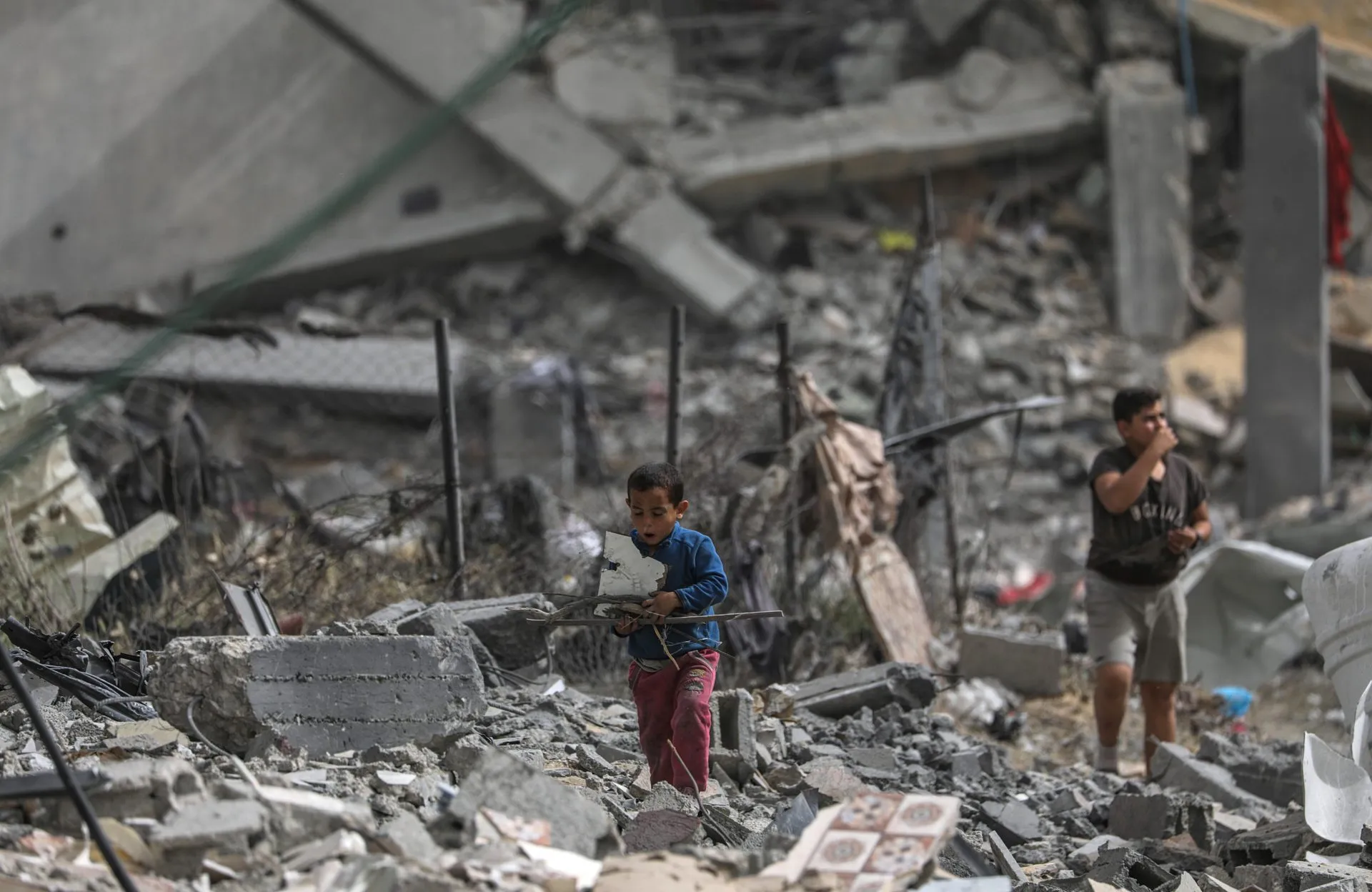International
Unicef warns that the military incursion in Rafah is “catastrophic” for thousands of children

UNICEF warned on Monday that one of Israel’s military incursion into Rafah, in the south of the Gaza Strip, is “catastrophic” for 600,000 children who take refuge in the city, thousands of whom have a disability, medical condition or other vulnerability that puts them in even greater danger.
“Rafah is now a city of children who have no safe place to go in Gaza,” Catherine Russell, executive director of UNICEF, said in a statement after the warning from the Israeli Army that ordered the evacuation of about 100,000 residents of Rafah in the face of the possibility of a military action.
According to the United Nations Children’s Fund (Unicef), after the October evacuation orders to move south, it is estimated that there are now about 1.2 million refugees in Rafah, which was home for 250,000 people.
Another aspect to take into account, given the high concentration of children, – including many who are very vulnerable and on the verge of survival – as well as the probable intensity of violence, with possible evacuation corridors probably mined or full of unexploded ammunition and services in relocation areas that are most likely limited,
He said that military operations will cause a large number of civilian casualties and that the few basic services and infrastructures that remain and that they need to survive, will be totally destroyed.
“More than 200 days of war have taken an unimaginable price in children’s lives,” Russell said.
He also assured that if large-scale military operations are carried out, children will not only be at risk of suffering violence, but also chaos and panic, “at a time when their physical and mental states are already weakened.”
Killed and injured disproportionately, children suffer more acutely from interruptions in medical care, education and lack of access to sufficient food.
According to the Palestinian Ministry of Health, more than 14,000 children have died in the conflict that began on October 7.
UNICEF estimates that about 65,000 children have some pre-existing disabilities, including difficulties seeing, hearing, walking, understanding and learning; that about 78,000 are under two years of age and that, of them, almost 8,000 suffer from acute malnutrition.
In addition, about 175,000 children under the age of 5 (or 9 out of 10) are affected by one or more infectious diseases and almost all of them already need psychosocial and mental health support, said the organization, which called for an “immediate and lasting” humanitarian ceasefire, the release of the hostages and the end of any serious violation against children.
International
Police investigate deaths of Rob Reiner and wife as apparent homicide

The Los Angeles Police Department (LAPD) is investigating the deaths of Hollywood actor and filmmaker Rob Reinerand his wife as an “apparent homicide,” amid a wave of tributes to the director of classics such as When Harry Met Sally.
According to U.S. media reports on Sunday, Rob Reiner and Michele Singer Reiner were found dead at their Los Angeles mansion with what appeared to be stab wounds.
Several political figures shared messages of condolence following the reported deaths of the director of A Few Good Menand his wife.
While the LAPD did not officially confirm the identities of the victims, it stated that homicide detectives were dispatched to the Reiner residence.
“At this time, no additional details are available and the investigation into an apparent homicide is ongoing,” the Los Angeles Police Department said in a statement posted on social media.
LAPD Deputy Chief Alan Hamilton told reporters that no arrests have been made and that no individuals are currently being questioned as suspects.
“I’m not going to confirm whether anyone is being questioned at this moment or not. We are going to try to speak with as many family members as we can,” Hamilton said.
CNN reported that a family spokesperson confirmed the deaths of Reiner and his wife.
California Governor Gavin Newsom, former U.S. President Barack Obama, and former Vice President Kamala Harrisissued statements expressing their condolences.
International
U.S. and Mexico Reach Deal to Address Water Deficit Under 1944 Treaty

The United States and Mexico have reached an agreement to comply with current water obligations affecting U.S. farmers and ranchers and for Mexico to cover its water deficit to Texas under the 1944 Water Treaty, the U.S. Department of Agriculture said in a statement.
The department уточified that the agreement applies to both the current cycle and the water deficit from the previous cycle.
On Monday, U.S. President Donald Trump accused Mexico of failing to comply with the water-sharing treaty between the two countries, which requires the United States to deliver 1.85 billion cubic meters of water from the Colorado River, while Mexico must supply 432 million cubic meters from the Rio Grande.
Mexico is behind on its commitments. According to Washington, the country has accumulated a deficit of more than one billion cubic meters of water over the past five years.
“This violation is severely harming our beautiful crops and our livestock in Texas,” Trump wrote on Monday.
The Department of Agriculture said on Friday that Mexico had agreed to supply 250 million cubic meters of water starting next week and to work toward closing the shortfall.
Agriculture Secretary Brooke Rollins, quoted in the statement, said Mexico delivered more water in a single year than it had over the previous four years combined.
Trump has said that if Mexico continues to fall short of its obligations, the United States reserves the right to impose 5% tariffs on imported Mexican products.
Mexico’s Deputy Foreign Minister for North America, Roberto Velasco, said that a severe drought in 2022 and 2023prevented the country from meeting its commitments.
International
Several people shot in attack on Brown University campus

Several people were shot on Saturday in an attack on the campus of Brown University, in the northeastern United States, local police reported.
“Shelter in place and avoid the area until further notice,” the Providence Police Department urged in a post on X. Brown University is located in Providence, the capital of the state of Rhode Island.
U.S. President Donald Trump said on his social media platform Truth Social that he had been briefed on the situation and that the FBI was on the scene.
At 5:52 p.m. local time (11:52 p.m. GMT), Brown University said the situation was still “ongoing” and instructed students to remain sheltered until further notice.
After initially stating that the suspect had been taken into custody, Trump later posted a second message clarifying that local police had walked back that information. “The suspect has NOT been apprehended,” the U.S. president said.
-

 International4 days ago
International4 days agoWashington declares State of Emergency as atmospheric river brings severe flooding
-

 International4 days ago
International4 days agoU.S. to require five-year social media history from tourists under Visa Waiver Program
-

 International3 days ago
International3 days agoCuba battles out-of-control dengue and chikungunya epidemic as death toll rises to 44
-

 Central America3 days ago
Central America3 days agoHonduras election crisis deepens as CNE president denounces intimidation attempts
-

 Central America4 days ago
Central America4 days agoOAS and EU urge honduran political actors to respect vote results and avoid unrest
-

 International3 days ago
International3 days agoColombia says it would not reject Maduro asylum request as regional tensions escalate
-

 International2 days ago
International2 days agoSeveral people shot in attack on Brown University campus
-

 International3 days ago
International3 days agoEcuador on track for record violence as homicides hit highest level in Latin America again
-

 International4 days ago
International4 days agoSix ecuadorian soldiers jailed pending trial for alleged extrajudicial execution
-

 International2 days ago
International2 days agoU.S. and Mexico Reach Deal to Address Water Deficit Under 1944 Treaty
-

 Central America12 hours ago
Central America12 hours agoPanama seizes over three tons of drugs hidden in Caribbean port container
-

 Central America4 minutes ago
Central America4 minutes agoOAS urges swift recount in Honduras as election results remain uncertain
-

 International1 minute ago
International1 minute agoPolice investigate deaths of Rob Reiner and wife as apparent homicide


























